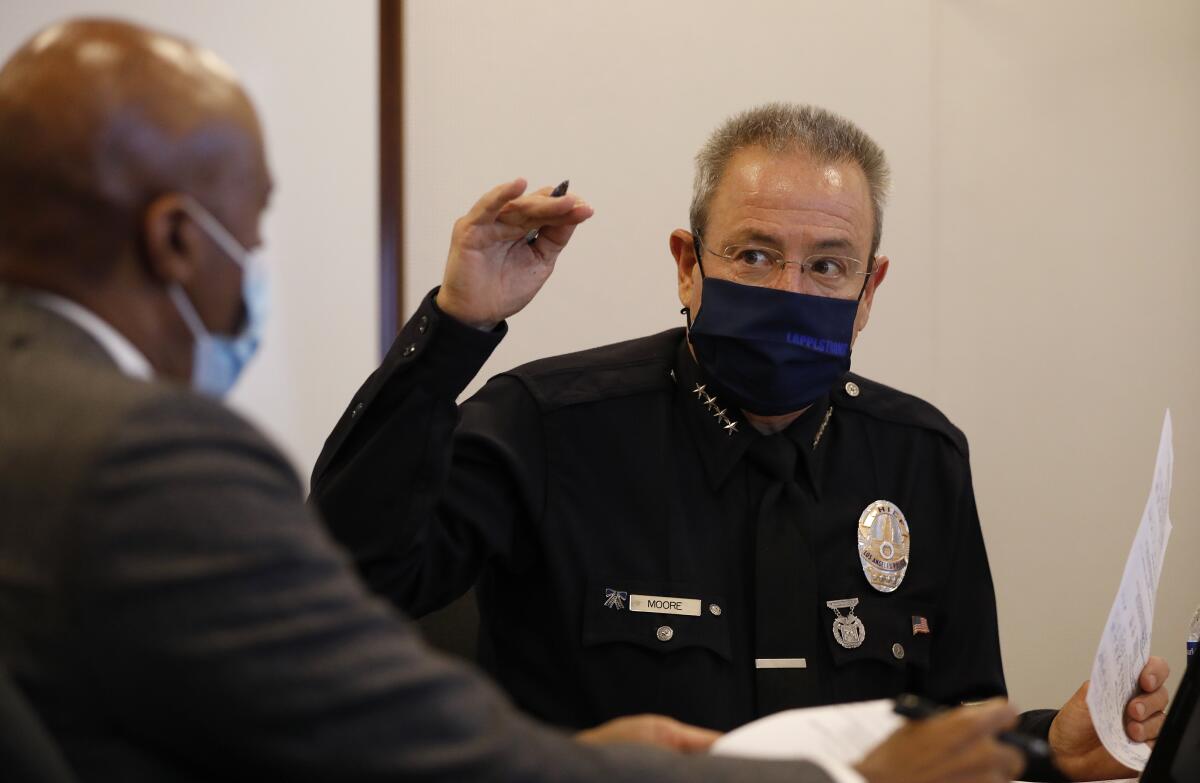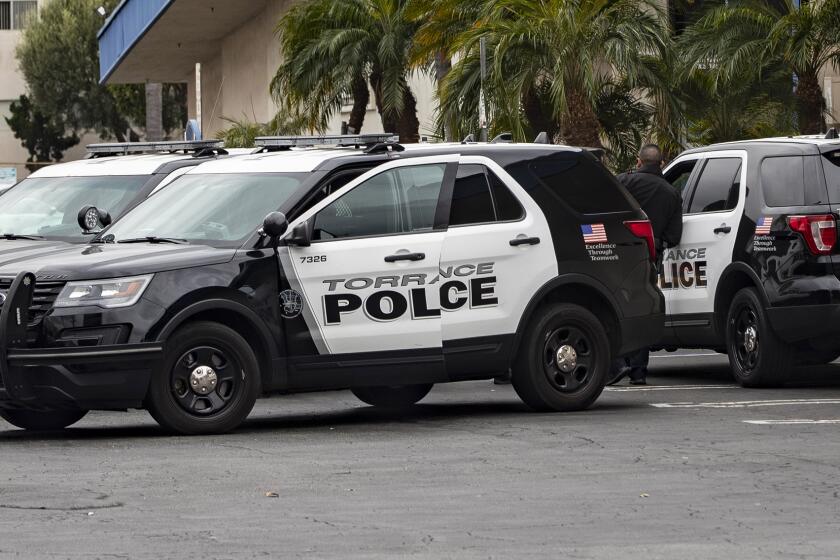LAPD officers caught joking about earning overtime after shooting someone

- Share via
As two Los Angeles Police Department officers stood over a machete-wielding man they had shot last year in the San Fernando Valley, they joked about how they would soon be earning overtime pay — presumably from filling out paperwork in the aftermath of the incident.
It was the sort of off-color banter that might have gone unnoticed in the era before body-worn cameras and other technology began to routinely capture candid conversations between cops. But the brusque parlance of police, which used to be confined to squad cars and roll call rooms, is increasingly on full display. Some law enforcement officials defend gallows humor and profanity as a necessary, if unsavory, part of the job, while linguists and others who study policing say obscene language only escalates encounters and undermines public trust.
For the record:
4:36 p.m. Aug. 9, 2023An earlier version of this story reported that the encounter between LAPD officers and Christian Arriola-Gomez occurred in Sylmar. The incident took place in Lake Balboa.
The overtime comments came to light during the LAPD’s investigation into the shooting of 24-year-old Christian Arriola-Gomez in Lake Balboa on Aug. 17, 2022. The LAPD released a video after the incident that included body- and dash-cam footage — but left out the overtime conversation, which was not disclosed to the public until a report from Chief Michel Moore that was released last week.
The confrontation with Arriola-Gomez began when a resident called 911 to report a man with a machete peering into the backyard of a home in the 17300 block of Sherman Way, according to police. Arriving officers ordered Arriola-Gomez to drop the machete but said he ignored them, instead riding away on a bicycle. He eventually returned to the scene and began yelling at the officers, including Jeffrey Smith, a traffic officer who responded to a request for backup, police said.
Smith opened fire when Arriola-Gomez moved toward him in an alley and started to raise the machete in the air, police said. While standing over the mortally wounded man, Smith and another officer, Derrick Quals, started making “jokes regarding overtime as a result” of the shooting, according to the chief’s report on the incident. Arriola-Gomez was taken to a hospital, where he was pronounced dead.
Moore was critical of the officers’ comments, saying they violated “professionalism standards.” The officers received the department’s equivalent of a slap on the wrist: an employee comment card in their personnel files. Moore ultimately ruled that the shooting was within policy because of the imminent threat posed by a suspect with a machete, but faulted the officers for tactical mistakes and said Smith “should have rendered basic medical assistance” instead of leaving Arriola-Gomez to lie bleeding on the pavement.
An LAPD spokesperson told The Times the matter is still under investigation and said: “The Department encourages the practice of courtesy in all public contacts.”
The episode was the latest in a string of incidents involving LAPD officers caught making inappropriate remarks.
In the spring of 2022, a SWAT officer was recorded on another officer’s body camera saying, “Happy hunting,” as his colleagues prepared to confront an armed suspect who had holed up in a downtown apartment building. SWAT snipers later killed the man; their decision to use lethal force was deemed justified by Moore, who cited the threat to public safety posed by an armed suspect.
Chief Michel Moore has ordered an internal review of SWAT team operations to determine whether “any potential problems or patterns” exist in how the unit uses force.
The officer who made the remark, Leon Maya, received a two-day suspension. After the comment was reported by The Times, Moore ordered an internal review of SWAT team operations over the previous 10 years to determine whether “any potential problems or patterns” existed; the controversial study concluded that the elite unit had no culture of violence. The family of the man who was shot has since sued the city, arguing that the “happy hunting” comment encouraged officers to use deadly force. The city has not yet responded in court to the allegations.
In a lesser-known episode from 2016, the SWAT team was called out to assist Mission Division officers in dealing with a mentally ill man who had barricaded himself inside a bathroom. At one point, an officer was heard on a supervisor’s body camera urging a colleague with a police K-9 to “tell the dog to go in there and f— bite this motherf—!”
A different officer was heard later in the encounter saying, “Too bad we don’t have [former L.A. County Sheriff Lee] Baca deputies standing by, we can just f— unholster and just shoot up 10,000 holes.”
Complaints about disrespectful and abusive language by officers toward civilians are nothing new.
In one notorious example, a report that followed the 1991 beating of Rodney King found that the officers involved had previously made racist comments about another Black motorist they stopped. Transcripts of in-squad computer messages that were released with the report showed that one of the officers referred to the King beating as a “big time use of force.” Another wrote, “I haven’t beaten anyone this bad in a long time.”
In the years since, other departments have been rocked with similar scandals when similarly unfiltered communications between officers were unearthed, including racist messages from Torrance police. Officers in Philadelphia and in Revere, Mass., were placed under investigation after videos surfaced of them using racial slurs during arrests.
Eight months after The Times revealed racist texts by Torrance police officers, city officials have done little to hold them accountable.
Still, discipline in such cases is rare.
LAPD records show that most officers punished for cursing or being rude to a colleague or a civilian are admonished or given an official reprimand. According to the records, which go back to 2020, there have been 29 sustained suspensions meted out to officers for misconduct that included a language-related offense.
Police cadets at the LAPD’s academy are instructed that what they say to the public — and how they say it — can affect the outcome of an encounter, with de-escalation emphasized at every turn. The department says it doesn’t recognize what it calls “tactical language,” which can include profanity, to get compliance from an uncooperative suspects, especially in high-risk scenarios.
But in practice, aggressive or profane commands are tolerated in some situations, according to a review of investigations of past police shootings.
Steve Gordon, a retired LAPD SWAT officer, said that while it doesn’t sound pretty, such language is sometimes the only way to get through to some people or signal the seriousness of a situation. Where he draws the line is when an officer’s language drifts into racist slurs or name-calling. The sort of macabre exchanges between officers that flow at crime scenes should not be taken at face value, he said, and can be meant to cope with an often grisly job.
“There’s gallows humor in anything,” said Gordon, who once served as a director of the Los Angeles Police Protective League, the union that represents the city’s rank-and-file officers. “A lot of officers tend to speak after situations as a way to relieve stress; and they might say some silly things, and to try to display to their peers that they’re OK, they’re fine, that it’s nothing.”
When an officer’s adrenaline kicks in during a life-and-death situation, the last thing they’re thinking of is decorum, he said: “That goes out the window when the s— hits the fan.”
Christina Gliser, a clinical psychologist at Forensic Specialty Group, a psychology consulting firm in Georgia, said that an officer’s attempts to match a suspect’s hostility could just as easily escalate a situation.
“More often than not, when you curse, you’re perceived as aggressive, out of control, demeaning,” she said. “Perhaps not surprisingly, whenever police use harsh language, it is negatively viewed by the public in that both men and women more often identify the officer’s (actions) as being excessive.”
Such perceptions also play on persistent gender and racial stereotypes, she added, meaning that female and officers of color tend to be seen as more aggressive when they curse than their white male colleagues.
The LAPD’s Inspector General’s office is conducting a study on officer language use, and the city is partnering with several universities to produce a second, more robust report on the issue, which has been the subject of several studies in recent years by researchers at Stanford and the University of Michigan.
“There’s going to be a training component once the study comes out to train folks on how to speak to members of the Black and brown community and other communities,” Police Commission President William Briggs said.
In the Michigan study, researchers played audio recordings from hundreds of routine traffic stops for participants, who were asked to rate officers’ interactions with motorists, whose race wasn’t revealed. The report found that officers communicated in a more respectful and friendlier manner with white men, while taking a less positive tone with Black men.
Nicholas Camp, an assistant professor of organizational studies who led the research at Michigan, said he and his colleagues found that an officer’s first 40 words were a strong predictor of how the rest of the encounter would go and “whether that driver was searched or arrested.”
Officers seemed to extend more patience to white drivers, Camp said.
“Even those interactions that don’t make the news and even those interactions that appear pretty routine on paper still matter for how people relate to police,” he said.
More to Read
Sign up for Essential California
The most important California stories and recommendations in your inbox every morning.
You may occasionally receive promotional content from the Los Angeles Times.













